人教版(2019)必修第一册:Unit 3 Sports and Fitness 第3课时 课件(共41张PPT)
文档属性
| 名称 | 人教版(2019)必修第一册:Unit 3 Sports and Fitness 第3课时 课件(共41张PPT) |
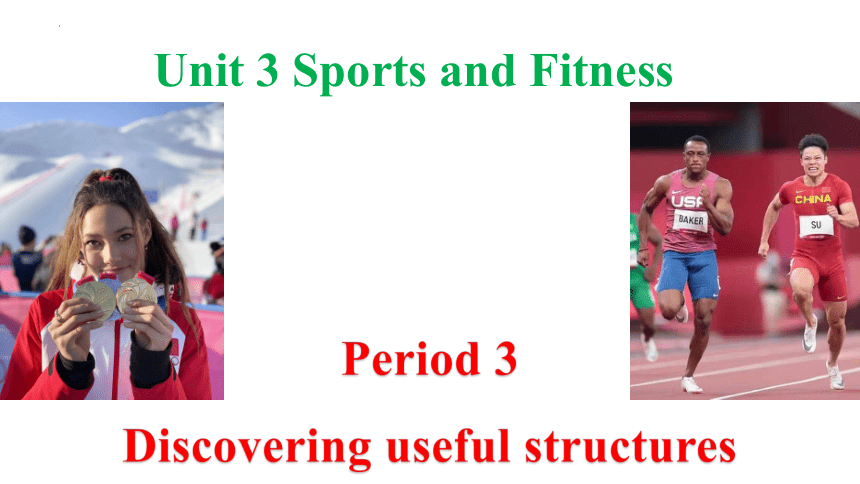
|
|
| 格式 | pptx | ||
| 文件大小 | 4.2MB | ||
| 资源类型 | 教案 | ||
| 版本资源 | 人教版(2019) | ||
| 科目 | 英语 | ||
| 更新时间 | 2022-11-05 09:40:04 | ||
图片预览

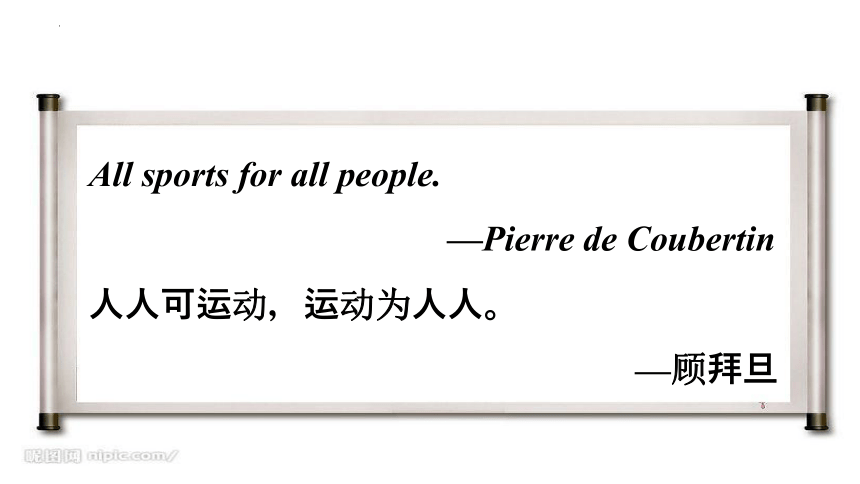
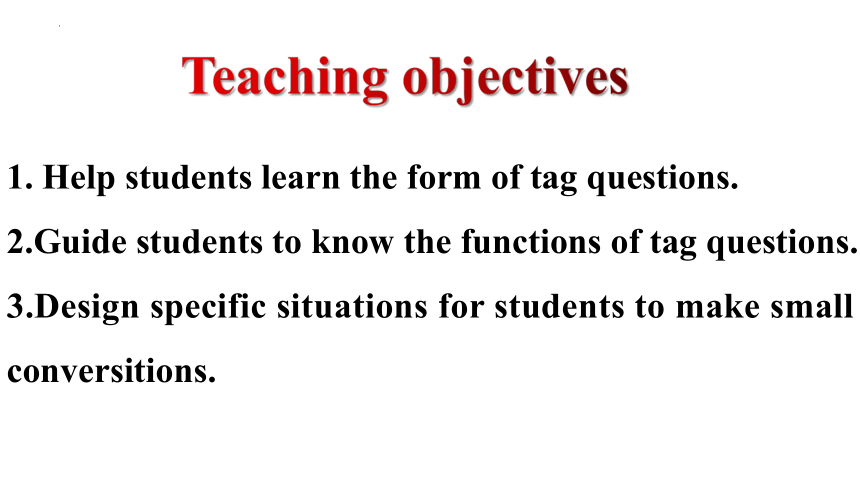
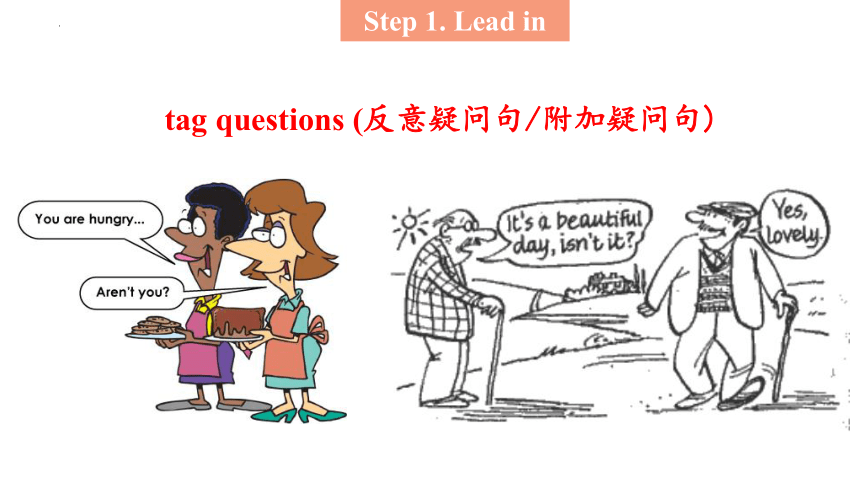

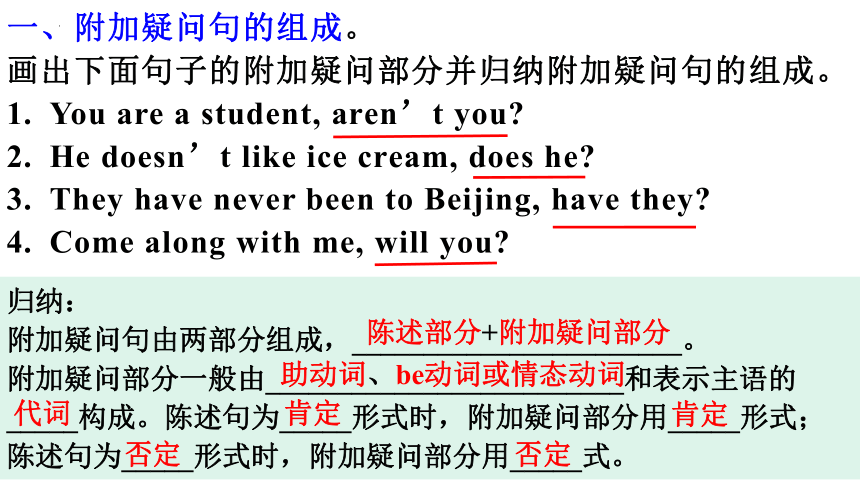
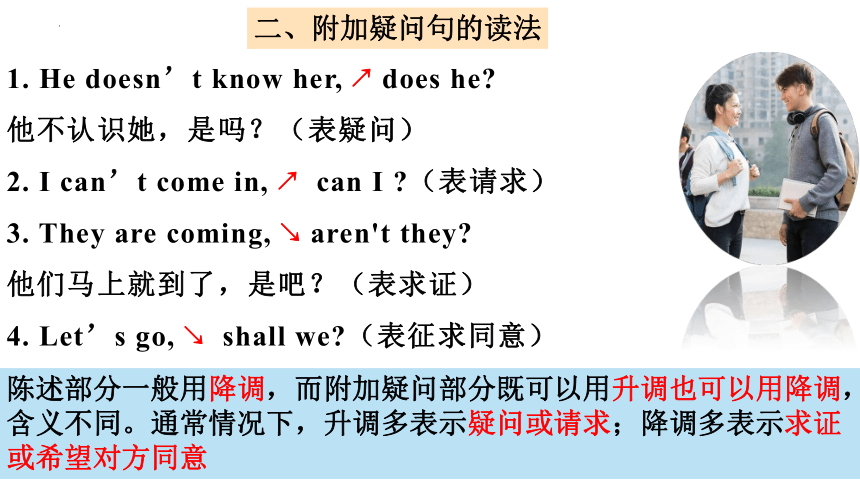
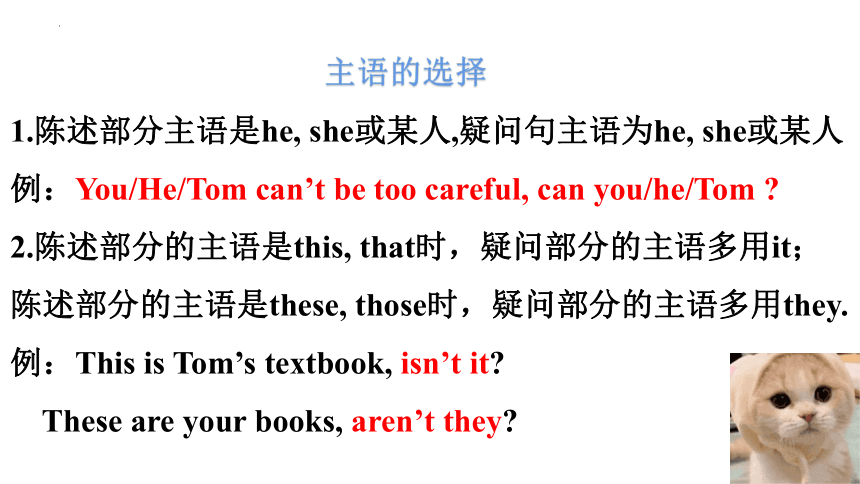
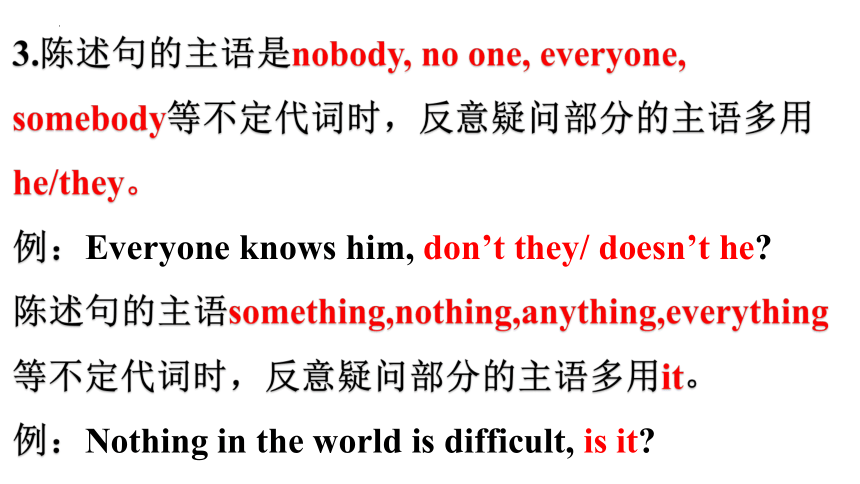
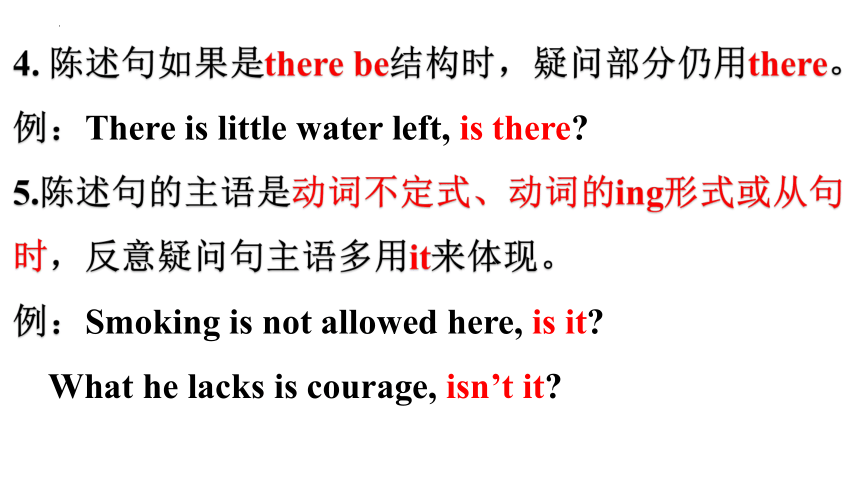
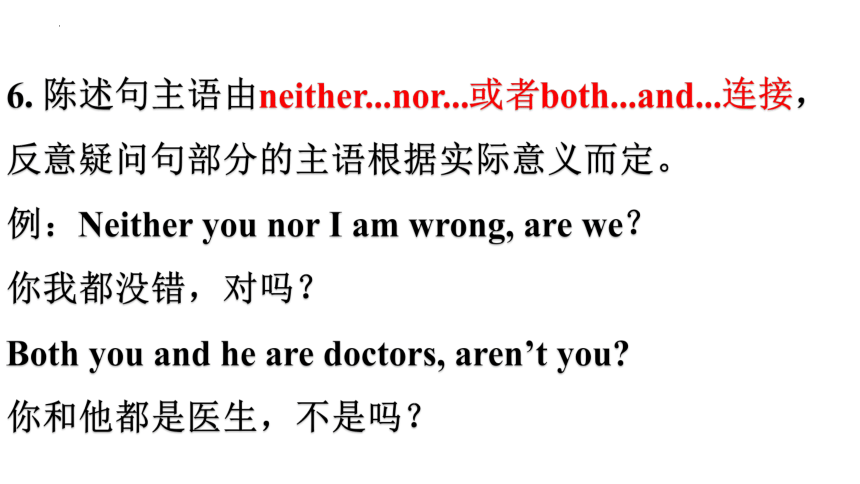
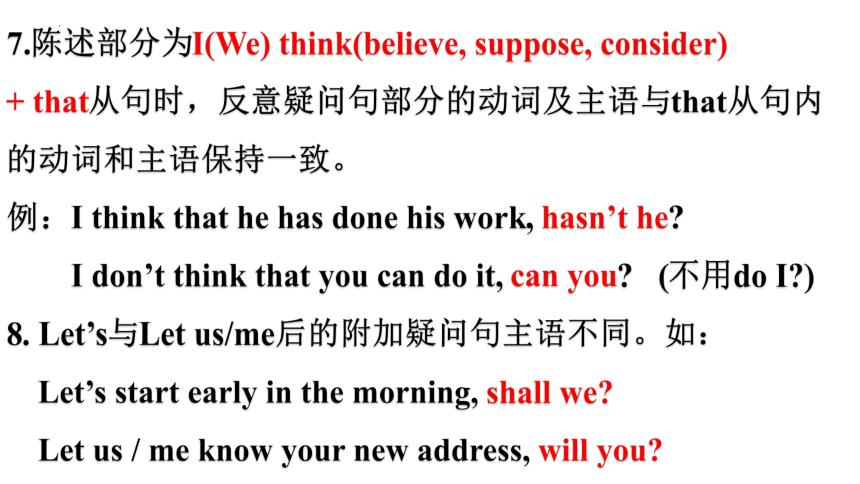
文档简介
(共41张PPT)
Unit 3 Sports and Fitness
Period 3
Discovering useful structures
All sports for all people.
—Pierre de Coubertin
人人可运动,运动为人人。
—顾拜旦
Teaching objectives
1. Help students learn the form of tag questions.
2.Guide students to know the functions of tag questions.
3.Design specific situations for students to make small conversitions.
tag questions (反意疑问句/附加疑问句)
Step 1. Lead in
疑问句类型
一般疑问句
e.g. Do you like these animals
2. 特殊疑问句
e.g. Who runs fastest in your class
3. 选择疑问句
e.g. Do you like to play football or basketball
4. 附加疑问句
e.g. I don’t think he will come, will he
一、附加疑问句的组成。
画出下面句子的附加疑问部分并归纳附加疑问句的组成。
You are a student, aren’t you
He doesn’t like ice cream, does he
They have never been to Beijing, have they
Come along with me, will you
归纳:
附加疑问句由两部分组成,_______________________。
附加疑问部分一般由_________________________和表示主语的_____构成。陈述句为_____形式时,附加疑问部分用_____形式;陈述句为_____形式时,附加疑问部分用_____式。
陈述部分+附加疑问部分
助动词、be动词或情态动词
代词
肯定
肯定
否定
否定
1. He doesn’t know her, ↗does he
他不认识她,是吗?(表疑问)
2. I can’t come in, ↗ can I (表请求)
3. They are coming, ↘aren't they
他们马上就到了,是吧?(表求证)
4. Let’s go, ↘ shall we (表征求同意)
二、附加疑问句的读法
陈述部分一般用降调,而附加疑问部分既可以用升调也可以用降调,含义不同。通常情况下,升调多表示疑问或请求;降调多表示求证或希望对方同意
主语的选择
1.陈述部分主语是he, she或某人,疑问句主语为he, she或某人
例:You/He/Tom can’t be too careful, can you/he/Tom
2.陈述部分的主语是this, that时,疑问部分的主语多用it;
陈述部分的主语是these, those时,疑问部分的主语多用they.
例:This is Tom’s textbook, isn’t it
These are your books, aren’t they
3.陈述句的主语是nobody, no one, everyone, somebody等不定代词时,反意疑问部分的主语多用he/they。
例:Everyone knows him, don’t they/ doesn’t he
陈述句的主语something,nothing,anything,everything等不定代词时,反意疑问部分的主语多用it。
例:Nothing in the world is difficult, is it
4. 陈述句如果是there be结构时,疑问部分仍用there。
例:There is little water left, is there
5.陈述句的主语是动词不定式、动词的ing形式或从句时,反意疑问句主语多用it来体现。
例:Smoking is not allowed here, is it
What he lacks is courage, isn’t it
6. 陈述句主语由neither...nor...或者both...and...连接,反意疑问句部分的主语根据实际意义而定。
例:Neither you nor I am wrong, are we?
你我都没错,对吗?
Both you and he are doctors, aren’t you
你和他都是医生,不是吗?
7.陈述部分为I(We) think(believe, suppose, consider)
+ that从句时,反意疑问句部分的动词及主语与that从句内的动词和主语保持一致。
例:I think that he has done his work, hasn’t he
I don’t think that you can do it, can you (不用do I )
8. Let’s与Let us/me后的附加疑问句主语不同。如:
Let’s start early in the morning, shall we
Let us / me know your new address, will you
谓语的选择
1.陈述部分谓语为have、has、had
(1)表示“拥有”,反意疑问句的谓语用have或do的相应形式都可以。
不表示“拥有”,用do 的相应形式。
例:They have a house in the town, haven’t they/don’t they
He has lunch at school, doesn’t he?
(2)陈述句的谓语动词是情态动词have(has)to(必须)时,疑问部分用do的相应形式。
例:They have to go there, don’t they?
He has to leave early, doesn’t he?
(3)陈述部分的谓语是had better(最好)时,疑问部分用hadn’t。
例:You’d better have a good rest, hadn’t you?
(4)陈述句中的谓语动词是wish时,疑问部分常用may。
例:You wish to go home, may you﹖
(5)陈述部分用used to +主语时,问句部分用didn’t + 主语?或usedn’t +主语?
例:She used to live in London, didn’t she / usedn’t she
They used to be good friends, didn’t they / usedn’t they
(6)陈述部分情态动词must表“必须”时,疑问部分用mustn’t
例: You must work hard next term, mustn’t you
I must answer the letter, mustn’t I
但是,当must 表示推测时,反意疑问部分多与must之后的动词形式和时态与句子主语保持一致。
例:Her mother must be a teacher, isn’t she?
She must have read the novel, hasn’t she?
You finished your homework,
One can’t always be perfect,
Everything is ready,
Everyone should be on time,
What he said isn’t true,
She dislikes sports,
There was a mountain,
didn't you
can one/he
isn’t it
shouldn’t they
is it
doesn’t she
wasn’t there
完成下列反意疑问句
反意疑问句的回答
附加疑问句的答语与一般疑问句类似,注意其与汉语表达习惯的差异。
事实是肯定的用yes+肯定结构,反之用no+否定结构。
但在前否后肯的结构中,yes表示“不”,no表示“是”。
如: — They work hard, don’t they
— Yes, they do./ No, they don’t.
是的,他们工作努力。/ 不,他们工作不努力。
— They don’t work hard, do they
— Yes, they do./ No, they don’t.
不,他们工作努力。/ 是的,他们工作不
努力。
2.当陈述句部分是否定结构,反意疑问句用肯定式提问时,回答yes或no与汉语的意思正好相反。这种回答时,yes要翻译为“不”,no翻译为“是”
例:---Lucy didn't attend the meeting, did she
露西没有参加会议,是吗?
--- Yes, she did. / No, she didn’t
不,她有参加。/是的,她没参加。
特殊用法1) 陈述部分I am时,疑问部分要用 aren't I.
I'm as tall as your sister,aren't I 我和你姐姐一样高,对吗?2) 陈述部分用 no, nothing, nobody, never, few, little, seldom, hardly等否定含义的词时,疑问部分用肯定含义。
如: The old man made no answer, did he
Jim is never late for school, is he
3)反意疑问句的陈述部分含有由un-, im-, in-, dis-, 等否定意义的前缀构成的词语时,陈述部分要视为肯定含义,问句部分用否定形式。
例:Your father is unhappy, isn’t he (不能用is he )
The man is dishonest, isn’t he (不能用is he
Tom dislikes the food, doesn’t he?
Tom不喜欢这个食物,不是吗?
4)反意疑问句的陈述部分主语是第一人称,且含有think, believe, expect, imagine, suppose等引导的宾语从句:
A.主语是第一人称(注意否定转移)
I don't think he is bright, is he
We believe she can do it better, can't she
B. 如果主语不是第一人称则疑问部分与主句相对应构成反意疑问句
He thought you were wrong, didn't he 不能说weren't you
5)肯定的祈使句的附加问句可用will you或won’t you,否定的祈使句的附加问句用will you.
Listen to me carefully, will/won’t you
Don’t play with fire, will you
Don't do that again, will you
Go with me, will you / won't you
6)Let's 开头的祈使句,后用shall we(或用shan't we)
而Let us 开头的祈使句,后用will you(或won't you)
Let's go and listen to the music, shall we(或用shan't we)
Let us wait for you in the reading-room, will you (或won't you)
Read the conversation. Decide whether the intonation of the tag questions is rising or falling.
Dave: Wonderful gym, isn’t it
Jack: Er…yes. It’s great.
Dave: This isn’t your first time here, is it
Jack: Actually, it is. you come here often, don’t you
Dave: Yep. At least three times a week.
Jack: You’ve lost some weight, haven’t you
Dave: Yes. All that fat has become muscle
now. If you want to lose weight, too. I
recommend using the spin bike.
Jack: OK, but it won’t make me too tired, will it
Dave: Maybe at first, but you’ll get used to it.
I used to come here every day when I
first started.
Jack: Oh, I don’t have to come here every day,
do I
Dave: No. Of course not. It’s up to you, isn’t it
I. 用反意疑问句补全句子。
1. No one wants to leave, ________
2. You must read more books next term, ___________
3. Let’s talk about your son now, _________
4. I don’t think you’ve heard of this concept
before, __________
do they
mustn’t you
shall we
have you
5. People should make the best of what
they’ve learnt, ______________
6. There have been some terrible scenes on
television, ______________
shouldn’t they
haven’t there
7. She seldom goes to the cinema, __________
8. You won't be away for long,________
9. You've already got our invitation, ____________
10. — Your uncle told me that he overslept.
— Oh, my uncle rarely used to oversleep, _________
11. We never dared to ask him a question, __________
12. The old lady scarcely cares for anything, _________
did we
does she
will you
haven't you
did he
does she
完成下列反意疑问句
1. It’s a fine day. Let’s go for a picnic, _______
2. Eason is late again. This is the third time
this week he’s been late, ______
shall we
isn’t it
3. —Daddy’s forgot to prepare a Christmas tree, ________
—I’m afraid he has.
4. —Sorry, I’m not feeling well and I don’t think I can finish.
—Don’t worry. Let us do it for you, _______
hasn’t he
will you
5. I don’t think he could have cheated in the exam, ______
6. —The ground is wet.
—It must have rained last night, _______
7. —Donna doesn’t think that Michael is generous, ________
—I’m afraid not.
did he
didn’t it
does she
8. —The new house need cleaning.
—Well, let’s clean it together, _______
9. There is little we can do about it, _______
10. —The problem wasn’t difficult for him, _____
—No, it wasn’t. He should have been given a more
difficult one.
shall we
is there
was it
II. 用恰当的反意疑问句补全下面对话。
Host: You’ve lived in Hollywood for many years, ___________
Guest: Since I was eighteen and came here to write my first screenplay.
Host: You didn’t know anyone here at first,__________
Guest: No. And I didn’t have a cent to my name.Just some ideas and a lot of hope. It sounds crazy, ________
haven’t you
did you
doesn’t it
Host: But things have worked out for you,__________ You’re working on another screenplay now, ___________
Guest: Yes. It's a comedy about some kids who become invisible.
Host: Speaking of kids, you have some of yourown, ________________
Guest: Two boys and a girl — all very visible!
Host: I know what you mean. Do you ever wish they were invisible
Guest: Now, that’s an interesting thought, ___________
haven’t they
aren’t you
don’t / haven’t you
isn’t it
三、句子改错。
1. You never told us why you were late for the last meeting. didn't you
2. The doctor soon had the patient walking again, hadn't he
3. Everything seems all right, isn't it
4. There won’t be any concert this Saturday evening, will it
5. Let’s go shopping, will you
6. —They don’t work hard, do they
—Yes, they do. They are very lazy.
did you
didn't he
doesn't it
will there
shall we
No, they don't.
Complete the conversations with appropriate tag questions or correct answers. Then act them out.
1. A: It’s not going to rain, is it
B: __________. It’s a good day for sports.
A: Then we can play football, ________
B: ___________. We don’t have a ball.
No, it isn’t
can’t we
No, we can’t
2. A: It’s Sports Day next Thursday, _______
B: You’re right, it is. Let’s ask Xia Lei if she wants to join a team.
A: She likes soccer, __________
B: ______________. But she loves volleyball. She could be in the volleyball team.
isn’t it
doesn’t she
No, she doesn’t
3. A: It’s time for badminton class. Where is the coach He’s late, _______
B: It’s been 10 minutes already. He isn’t coming, _____
A: Cool! We can have a good time. That’s great!
B: Shh!
A: Oh no, he’s right behind me, ______
C: Yes, I am!
isn’t he
is he
isn’t he
Use tag questions to role-play one of the situations below.
Review grammar.
Make a conversation according to Activity 3 on page 40.
Unit 3 Sports and Fitness
Period 3
Discovering useful structures
All sports for all people.
—Pierre de Coubertin
人人可运动,运动为人人。
—顾拜旦
Teaching objectives
1. Help students learn the form of tag questions.
2.Guide students to know the functions of tag questions.
3.Design specific situations for students to make small conversitions.
tag questions (反意疑问句/附加疑问句)
Step 1. Lead in
疑问句类型
一般疑问句
e.g. Do you like these animals
2. 特殊疑问句
e.g. Who runs fastest in your class
3. 选择疑问句
e.g. Do you like to play football or basketball
4. 附加疑问句
e.g. I don’t think he will come, will he
一、附加疑问句的组成。
画出下面句子的附加疑问部分并归纳附加疑问句的组成。
You are a student, aren’t you
He doesn’t like ice cream, does he
They have never been to Beijing, have they
Come along with me, will you
归纳:
附加疑问句由两部分组成,_______________________。
附加疑问部分一般由_________________________和表示主语的_____构成。陈述句为_____形式时,附加疑问部分用_____形式;陈述句为_____形式时,附加疑问部分用_____式。
陈述部分+附加疑问部分
助动词、be动词或情态动词
代词
肯定
肯定
否定
否定
1. He doesn’t know her, ↗does he
他不认识她,是吗?(表疑问)
2. I can’t come in, ↗ can I (表请求)
3. They are coming, ↘aren't they
他们马上就到了,是吧?(表求证)
4. Let’s go, ↘ shall we (表征求同意)
二、附加疑问句的读法
陈述部分一般用降调,而附加疑问部分既可以用升调也可以用降调,含义不同。通常情况下,升调多表示疑问或请求;降调多表示求证或希望对方同意
主语的选择
1.陈述部分主语是he, she或某人,疑问句主语为he, she或某人
例:You/He/Tom can’t be too careful, can you/he/Tom
2.陈述部分的主语是this, that时,疑问部分的主语多用it;
陈述部分的主语是these, those时,疑问部分的主语多用they.
例:This is Tom’s textbook, isn’t it
These are your books, aren’t they
3.陈述句的主语是nobody, no one, everyone, somebody等不定代词时,反意疑问部分的主语多用he/they。
例:Everyone knows him, don’t they/ doesn’t he
陈述句的主语something,nothing,anything,everything等不定代词时,反意疑问部分的主语多用it。
例:Nothing in the world is difficult, is it
4. 陈述句如果是there be结构时,疑问部分仍用there。
例:There is little water left, is there
5.陈述句的主语是动词不定式、动词的ing形式或从句时,反意疑问句主语多用it来体现。
例:Smoking is not allowed here, is it
What he lacks is courage, isn’t it
6. 陈述句主语由neither...nor...或者both...and...连接,反意疑问句部分的主语根据实际意义而定。
例:Neither you nor I am wrong, are we?
你我都没错,对吗?
Both you and he are doctors, aren’t you
你和他都是医生,不是吗?
7.陈述部分为I(We) think(believe, suppose, consider)
+ that从句时,反意疑问句部分的动词及主语与that从句内的动词和主语保持一致。
例:I think that he has done his work, hasn’t he
I don’t think that you can do it, can you (不用do I )
8. Let’s与Let us/me后的附加疑问句主语不同。如:
Let’s start early in the morning, shall we
Let us / me know your new address, will you
谓语的选择
1.陈述部分谓语为have、has、had
(1)表示“拥有”,反意疑问句的谓语用have或do的相应形式都可以。
不表示“拥有”,用do 的相应形式。
例:They have a house in the town, haven’t they/don’t they
He has lunch at school, doesn’t he?
(2)陈述句的谓语动词是情态动词have(has)to(必须)时,疑问部分用do的相应形式。
例:They have to go there, don’t they?
He has to leave early, doesn’t he?
(3)陈述部分的谓语是had better(最好)时,疑问部分用hadn’t。
例:You’d better have a good rest, hadn’t you?
(4)陈述句中的谓语动词是wish时,疑问部分常用may。
例:You wish to go home, may you﹖
(5)陈述部分用used to +主语时,问句部分用didn’t + 主语?或usedn’t +主语?
例:She used to live in London, didn’t she / usedn’t she
They used to be good friends, didn’t they / usedn’t they
(6)陈述部分情态动词must表“必须”时,疑问部分用mustn’t
例: You must work hard next term, mustn’t you
I must answer the letter, mustn’t I
但是,当must 表示推测时,反意疑问部分多与must之后的动词形式和时态与句子主语保持一致。
例:Her mother must be a teacher, isn’t she?
She must have read the novel, hasn’t she?
You finished your homework,
One can’t always be perfect,
Everything is ready,
Everyone should be on time,
What he said isn’t true,
She dislikes sports,
There was a mountain,
didn't you
can one/he
isn’t it
shouldn’t they
is it
doesn’t she
wasn’t there
完成下列反意疑问句
反意疑问句的回答
附加疑问句的答语与一般疑问句类似,注意其与汉语表达习惯的差异。
事实是肯定的用yes+肯定结构,反之用no+否定结构。
但在前否后肯的结构中,yes表示“不”,no表示“是”。
如: — They work hard, don’t they
— Yes, they do./ No, they don’t.
是的,他们工作努力。/ 不,他们工作不努力。
— They don’t work hard, do they
— Yes, they do./ No, they don’t.
不,他们工作努力。/ 是的,他们工作不
努力。
2.当陈述句部分是否定结构,反意疑问句用肯定式提问时,回答yes或no与汉语的意思正好相反。这种回答时,yes要翻译为“不”,no翻译为“是”
例:---Lucy didn't attend the meeting, did she
露西没有参加会议,是吗?
--- Yes, she did. / No, she didn’t
不,她有参加。/是的,她没参加。
特殊用法1) 陈述部分I am时,疑问部分要用 aren't I.
I'm as tall as your sister,aren't I 我和你姐姐一样高,对吗?2) 陈述部分用 no, nothing, nobody, never, few, little, seldom, hardly等否定含义的词时,疑问部分用肯定含义。
如: The old man made no answer, did he
Jim is never late for school, is he
3)反意疑问句的陈述部分含有由un-, im-, in-, dis-, 等否定意义的前缀构成的词语时,陈述部分要视为肯定含义,问句部分用否定形式。
例:Your father is unhappy, isn’t he (不能用is he )
The man is dishonest, isn’t he (不能用is he
Tom dislikes the food, doesn’t he?
Tom不喜欢这个食物,不是吗?
4)反意疑问句的陈述部分主语是第一人称,且含有think, believe, expect, imagine, suppose等引导的宾语从句:
A.主语是第一人称(注意否定转移)
I don't think he is bright, is he
We believe she can do it better, can't she
B. 如果主语不是第一人称则疑问部分与主句相对应构成反意疑问句
He thought you were wrong, didn't he 不能说weren't you
5)肯定的祈使句的附加问句可用will you或won’t you,否定的祈使句的附加问句用will you.
Listen to me carefully, will/won’t you
Don’t play with fire, will you
Don't do that again, will you
Go with me, will you / won't you
6)Let's 开头的祈使句,后用shall we(或用shan't we)
而Let us 开头的祈使句,后用will you(或won't you)
Let's go and listen to the music, shall we(或用shan't we)
Let us wait for you in the reading-room, will you (或won't you)
Read the conversation. Decide whether the intonation of the tag questions is rising or falling.
Dave: Wonderful gym, isn’t it
Jack: Er…yes. It’s great.
Dave: This isn’t your first time here, is it
Jack: Actually, it is. you come here often, don’t you
Dave: Yep. At least three times a week.
Jack: You’ve lost some weight, haven’t you
Dave: Yes. All that fat has become muscle
now. If you want to lose weight, too. I
recommend using the spin bike.
Jack: OK, but it won’t make me too tired, will it
Dave: Maybe at first, but you’ll get used to it.
I used to come here every day when I
first started.
Jack: Oh, I don’t have to come here every day,
do I
Dave: No. Of course not. It’s up to you, isn’t it
I. 用反意疑问句补全句子。
1. No one wants to leave, ________
2. You must read more books next term, ___________
3. Let’s talk about your son now, _________
4. I don’t think you’ve heard of this concept
before, __________
do they
mustn’t you
shall we
have you
5. People should make the best of what
they’ve learnt, ______________
6. There have been some terrible scenes on
television, ______________
shouldn’t they
haven’t there
7. She seldom goes to the cinema, __________
8. You won't be away for long,________
9. You've already got our invitation, ____________
10. — Your uncle told me that he overslept.
— Oh, my uncle rarely used to oversleep, _________
11. We never dared to ask him a question, __________
12. The old lady scarcely cares for anything, _________
did we
does she
will you
haven't you
did he
does she
完成下列反意疑问句
1. It’s a fine day. Let’s go for a picnic, _______
2. Eason is late again. This is the third time
this week he’s been late, ______
shall we
isn’t it
3. —Daddy’s forgot to prepare a Christmas tree, ________
—I’m afraid he has.
4. —Sorry, I’m not feeling well and I don’t think I can finish.
—Don’t worry. Let us do it for you, _______
hasn’t he
will you
5. I don’t think he could have cheated in the exam, ______
6. —The ground is wet.
—It must have rained last night, _______
7. —Donna doesn’t think that Michael is generous, ________
—I’m afraid not.
did he
didn’t it
does she
8. —The new house need cleaning.
—Well, let’s clean it together, _______
9. There is little we can do about it, _______
10. —The problem wasn’t difficult for him, _____
—No, it wasn’t. He should have been given a more
difficult one.
shall we
is there
was it
II. 用恰当的反意疑问句补全下面对话。
Host: You’ve lived in Hollywood for many years, ___________
Guest: Since I was eighteen and came here to write my first screenplay.
Host: You didn’t know anyone here at first,__________
Guest: No. And I didn’t have a cent to my name.Just some ideas and a lot of hope. It sounds crazy, ________
haven’t you
did you
doesn’t it
Host: But things have worked out for you,__________ You’re working on another screenplay now, ___________
Guest: Yes. It's a comedy about some kids who become invisible.
Host: Speaking of kids, you have some of yourown, ________________
Guest: Two boys and a girl — all very visible!
Host: I know what you mean. Do you ever wish they were invisible
Guest: Now, that’s an interesting thought, ___________
haven’t they
aren’t you
don’t / haven’t you
isn’t it
三、句子改错。
1. You never told us why you were late for the last meeting. didn't you
2. The doctor soon had the patient walking again, hadn't he
3. Everything seems all right, isn't it
4. There won’t be any concert this Saturday evening, will it
5. Let’s go shopping, will you
6. —They don’t work hard, do they
—Yes, they do. They are very lazy.
did you
didn't he
doesn't it
will there
shall we
No, they don't.
Complete the conversations with appropriate tag questions or correct answers. Then act them out.
1. A: It’s not going to rain, is it
B: __________. It’s a good day for sports.
A: Then we can play football, ________
B: ___________. We don’t have a ball.
No, it isn’t
can’t we
No, we can’t
2. A: It’s Sports Day next Thursday, _______
B: You’re right, it is. Let’s ask Xia Lei if she wants to join a team.
A: She likes soccer, __________
B: ______________. But she loves volleyball. She could be in the volleyball team.
isn’t it
doesn’t she
No, she doesn’t
3. A: It’s time for badminton class. Where is the coach He’s late, _______
B: It’s been 10 minutes already. He isn’t coming, _____
A: Cool! We can have a good time. That’s great!
B: Shh!
A: Oh no, he’s right behind me, ______
C: Yes, I am!
isn’t he
is he
isn’t he
Use tag questions to role-play one of the situations below.
Review grammar.
Make a conversation according to Activity 3 on page 40.
